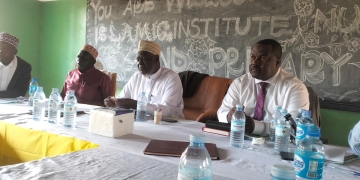NAMIREMBE – Church of Uganda Heads of Higher Education Learning Association (COUHELA) has unveiled a research agenda aimed at initiating and scaling developmental projects through social and technological innovations.This initiative will also see the establishment of an endowment fund to facilitate this development.

While addressing the first COUHELA Symposium, which brought together Chairpersons of Councils, Vice Chancellors, Deputy Vice Chancellors, and College Principals from various Church of Uganda-affiliated institutions at the Provincial Secretariat in Namirembe on Thursday, Dr. Fredrick Kakembo, the Deputy Vice Chancellor of Ndejje University outlined key areas of interest and strategies designed to achieve these goals.
According to Dr. Kakembo, the primary focus of the research agenda includes multidisciplinary research and innovation, developmental programs for the church and its communities, publications to raise public awareness of development challenges and remedies, and capacity-building programs to foster significant advancements within the Church of Uganda and its associated communities.
Dr. Kakembo disclosed that the Association will establish a research coordinators forum to facilitate coordination and collaboration among researchers and identify niches within higher institutions and universities through institutional mapping, enabling them to ecognize who excels in various research areas.
According to Rev. Canon Dr. Paul Kakooza, the Director of Education Services in the Church of Uganda, the initiatives aim at achieving tangible outcomes in the form of community development projects and academia-public-private partnerships involving government agencies, companies, industries, NGOs, embassies, CSOs, and international agencies.
“The identified areas of research, projects, and publications central to community welfare and development include church ministry and estates development, ICT, Education and development, STEM (Science, Technology, Engineering, and Math),
Environment and sustainable development, medicine and public health, agriculture, forestry and fisheries, business and management, humanities, social sciences, law, policy, and institutional development, among other disciplines,” Dr. Kakooza said.
During the two-day symposium, researchers from various institutions delivered several notable presentations. Highlights included “Contending Forces in Sustainable Gambling: Towards a Balanced Approach to Mitigate Threats within the Church of Uganda institutions in Mbale Diocese, Uganda” by Rev. Koboi Emmanuel, “Using Wikis to enhance Social Justice Among Pre-Service Teachers at Makerere University” by Dr. Dorothy Kyagaba Sebbowa, and “Effective Application and Management of Information Communication Technology (ICT) to Enhance the Performance of Church of Uganda Secondary Schools in West Nile” by Robert Wamusi.
Other significant presentations covered topics such as adaptation of instructional materials for visually impaired learners, universal secondary education funding, the Nexus between linguistic landscape and literacy skills development, competency-based Curriculum approaches for household sustainability, and the impact of Uganda’s plastic bags policy on environmental quality
Prof. John Mugisha, the Vice Chancellor of Bishop Stuart University, pledged on behalf of the University to publish all these papers in their journal.
Prof. Aaron Mushengyezi, the Vice Chancellor of Uganda Christian University and Chair of COUHELA, underscored the urgent need for concerted efforts to establish an Endowment fund to support research and development. He emphasized that this fund would play a pivotal role in advancing impactful research projects and ensuring the sustainability of educational initiatives across the Church’s institutions.
In his keynote address, Rev. Canon Dr. Alex Kagume, Deputy Executive Director of the Uganda National Council for Higher Education and Chair of the Church of Uganda Commission for Higher Education, emphasized the need for deliberate strategies to ensure the sustainability of the Church of Uganda’s higher education institutions.
While closing the symposium, the Archbishop of the Church of Uganda, The Most Rev. Dr. Stephen Samuel Kaziimba Mugalu, who was represented by Rt. Rev. Prof. Alfred Olwa, the Bishop of Lango Diocese and Chair of the Council for Uganda Christian University, highlighted the importance of collaboration and sustainability within Church institutions.
“I call upon the Directorate of Education to initiate a brainstorming session to explore how to enhance synergy and cooperation among the Church’s higher learning institutions. This is crucial for maximizing our collective impact and improving our institutional frameworks,” the Archbishop said.
He commended the National Council for Higher Education for its role in advancing institutional performance and ensuring educational quality, and for its significant support, which has been instrumental in helping our institutions thrive.
He justified the focus on research, advocacy, and publications, emphasizing their importance for community relevance and addressing local challenges through multidisciplinary approaches.
“Our commitment to research and advocacy is vital for staying relevant and addressing community issues effectively. By working together, we can achieve more and strengthen our mutual partnerships,” Bishop Olwa also stressed the need for sustainability, urging institutions to incorporate sustainability into their strategic plans and to establish endowment funds to safeguard against future crises.
In her presentation, Prof. Mary Okwakol, the Executive Director of the National Council for Higher Education, outlined the process for universities to obtain charters and have their academic programs accredited.
She emphasized the importance of compliance, condemning non-compliance for its potential to damage reputations and erode public trust.
“Non-compliance can lead to significant reputation damage and negative publicity, which can rapidly undermine trust built over decades. Compliance determines the quality of education, facilitates efficient institutional operations, and helps avoid penalties while building public trust in educational services,” Prof. Okwakol explained.
Prof. Okwakol highlighted the collective responsibility of institutions, professional bodies, and the National Council for Higher Education in maintaining high educational standards.
“Ensuring quality education services is a shared duty, and it is critical for the success and reputation of our institutions. I urge all stakeholders in higher education to adhere to established rules and standards to ensure excellence and uphold the integrity of the education system.” Prof Okwakwol said
Hon Dr. Monica Musenero, the Minister of Science, Technology, and Innovation in the office of the President, who was represented by Dr. Cosmas, the Superintendent of innovations, pledged the government’s full support to the Church of Uganda in its research endeavors.
Dr Musenero highlighted the government’s commitment to fostering innovation and technological advancement as pivotal for national development and assured that the ministry would collaborate closely with the Church through COUHELA to enhance its research initiatives.










